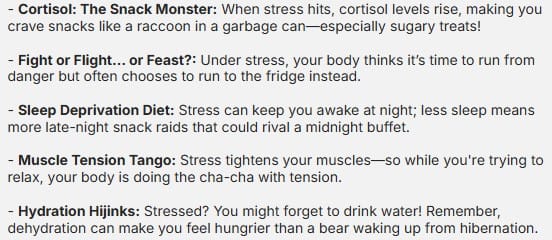Please Note: This post may contain affiliate links. If you click one of them, we may receive a commission at no extra cost to you. As an Amazon Associate, I earn from qualifying purchases.
We've all been there: a long day at work, an unexpected family reunion, or the clock ticking down to a deadline. Doesn't it seem like stress is just a part of life? But here's the kicker: did you know that stress can make you gain weight? Yes, you heard me right! It's like learning that your favorite dessert has extra calories that you didn't know about. Let's get into this tricky scenario and examine how stress can add inches to our waistlines.
Top Takeaways and Key Concepts
Recognize stress triggers: Identify situations causing stress to prevent emotional eating and weight gain.
Manage comfort food cravings: Pause and assess hunger before reaching for high-calorie snacks.
Support metabolism with healthy habits: Sleep well, exercise, and manage cortisol to maintain energy balance.
Incorporate stress-reducing activities: Practice yoga, meditation, or deep breathing to reduce stress and overeating.
Seek social or professional support: Connect with friends, groups, or therapists to manage stress effectively.
Summary of This Article
The article explores how stress contributes to weight gain by increasing cortisol, slowing metabolism, and triggering emotional eating. Comfort foods temporarily boost mood but create a cycle of cravings, guilt, and overeating. Effective strategies include recognizing stress triggers, practicing mindful eating, incorporating exercise, and prioritizing sleep to regulate hormones. Additionally, stress reduction techniques like yoga, meditation, and social support can prevent unhealthy habits. A holistic approach—balancing physical, emotional, and social well-being—helps maintain both weight and mental health.
Understanding Stress: What Happens in Your Body?

When stressed, your body can go into “fight or flight” mode, which means it might think you're about to outrun a bear. This leads to the release of cortisol, which can increase appetite—so you could end up snacking like you’re preparing for hibernation instead of dealing with everyday stress!
“Weight is not an issue. It’s about being healthy and feeling good.” — Jennifer Aniston
First, let's talk about what stress truly is. You might think of it as the feeling you get when you have too much to do or are worried about a big presentation the next day. But on a biological level, stress makes your body go into fight-or-flight mode. This is when things start to get fun! When you're stressed, your body makes hormones like adrenaline and cortisol. These little creatures are good for quick spurts of energy, but not so much for your long-term health.
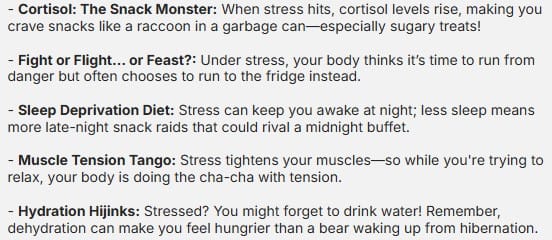
Now imagine you’re facing a bear (not literally, I hope!). Your body needs energy to escape—so it pumps out glucose into your bloodstream. Sounds good until you realize that if you're not running away from any bears (or deadlines), all that sugar can turn into fat instead! Interestingly enough, chronic stress keeps those cortisol levels high, which may lead to increased appetite and cravings for high-calorie foods. Who knew being stressed could make us feel like we need an extra slice of pizza?
The Comfort Food Trap

Eating comfort food can trigger a release of serotonin, which is often called the “feel-good” hormone. So, when you dive into that tub of ice cream, your brain might just be trying to turn your frown upside down—one scoop at a time!
“I'm on the patch right now. I'm on the chocolate patch.” — Ellen DeGeneres
Let's talk about comfort eating, which is a common way to deal with stress. Have you ever jumped right into a tub of ice cream after a bad day? You are definitely not alone! When we're stressed, our brains often want sugary or fatty foods because they make dopamine, the “feel-good” hormone, come out. In other words, those tasty snacks make us happy for a short time, but they could also make us gain weight.
But this is where things get tricky: eating comfort food could help you feel better for a little while, but it can also start a habit that's hard to escape. You eat because you're anxious, then you feel bad about eating too much, and then more stress comes on. It's like a giant merry-go-round of feelings and snacks! Seriously, who wants that kind of turmoil in their life?
Let's take a closer look at this emotional ride. When we grab for those familiar snacks, like warm cookies or buttery popcorn, we're generally trying to escape our mood instead of being really hungry. It's almost like our brains have told us to link specific foods with warmth, like how we might look for a warm blanket on a cold day. But these foods don't make us feel good for long; instead, they give us short-term highs that are followed by low points that make us feel worse than before.
And the shame! Oh wow, the guilt is real. We often feel bad about ourselves after eating too many chips and dip late at night (or was it three slices of cake?). As we strive to make sense of our decisions, the phrase “Why did I do that?” keeps coming back to us. This guilt can be too much to handle and just makes an already stressful situation much more uncomfortable. Instead of just enjoying the food and moving on, we are stuck in this loop where every mouthful makes us feel bad.
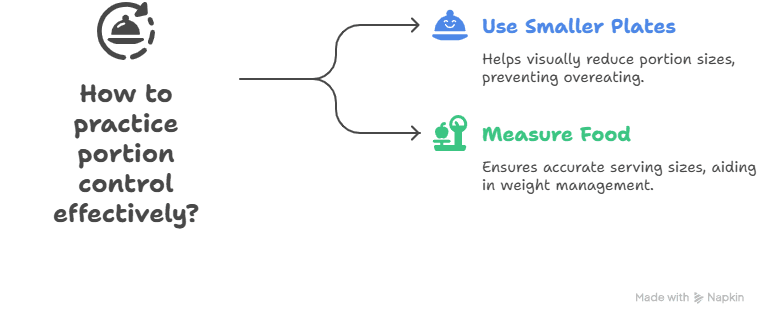
Then again, we shouldn't forget about the consequences on the body that are going on here. When you are stressed, your body goes into fight-or-flight mode, which makes you want high-calorie foods that claim to give you energy quickly but don't really feed you. It's like trying to fill up a car with soda instead of gas. It might give you a temporary boost, but it won't get you very far in the long term! We don't realize that craving more comfort food when we're stressed only makes us gain weight and feel worse emotionally.
Breaking this loop is interesting since it involves both awareness and action. It's important to know when you're eating because you're stressed and not because you're hungry. If you grab for those potato chips after a long day at work, stop for a second. Think about whether you really are hungry or whether something else is making you want to eat, such being bored or worried about the meeting tomorrow.
Finding healthy ways to deal with stress could be the key to breaking this never-ending cycle! Instead of rummaging the cupboard, you may go for a quick stroll outside or read a nice book. You could find that there are many ways to calm your mind and body without adding more calories or drama to your life.
In the end, life is too short to be stuck in patterns that make us feel worse than we did before. Let's stop eating snacks that make us feel bad and start doing things that are better for us and help us deal with stress while also keeping our waistlines happy!
How Stress Affects Metabolism

When you're stressed, your body can enter “fight or flight” mode, which means it might hold onto fat like it's preparing for a bear attack—because who knows when that next donut will be available during a crisis?
“Your diet is a bank account. Good food choices are good investments.” — Bethenny Frankel
Let's look more closely at metabolism because it has a big effect on how our bodies deal with stress-related weight gain. Our metabolism is basically how fast our bodies turn food into energy. When we're under a lot of stress all the time, this process can slow down a lot since cortisol levels are high.
It's hard to run a race in heavy boots, so don't try it! You'd feel slow, right? That's how our bodies react when we're stressed out. When life throws us curveballs, our metabolism might slow down like a tortoise in a race. Cortisol, the well-known stress hormone, puts our bodies into survival mode. They act like we're about to face a lion instead of just dealing with an overflowing inbox or that awkward conversation at the office party.
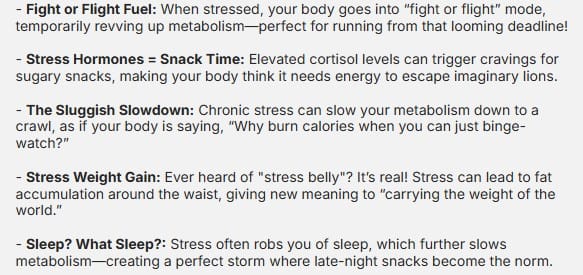
Let's break this down now. Stress causes cortisol levels to rise, which makes our bodies store energy instead of using it up quickly. This means we burn fewer calories during the day, which is like attempting to drive your car on empty; it doesn't go very far! So here we are, going about our daily lives with those heavy boots on and feeling like we want more and more high-calorie comfort foods. It's funny to think about how one minute you're stressed out and the next you're knee-deep in chips and ice cream!
Speaking of desires, have you ever noticed that some foods appear to scream your name more loudly when you're stressed? You're not the only one! When we're feeling stressed, our brains tell us to look for sweet and fatty foods because they provide us instant pleasure and dopamine, which is the brain's “feel-good” neurotransmitter. But here's the kicker: these delicacies might make us happy for a little while (and let's be honest, who doesn't love chocolate?), but they usually make us feel guilty later and don't do anything for our long-term happiness or health.
This combination of a slower metabolism and stronger cravings is a recipe for weight gain. It's like being stuck on a merry-go-round that makes you get closer to that extra muffin top with each spin. The more worried we are, the more inclined we are to eat those unhealthy snacks, which makes things worse by making us feel even worse about ourselves.
What can we do about this? First of all, it's important to recognize that stress can lead to weight gain. You may start to change if you grasp what's going on in your body during those busy times, like why running in heavy boots doesn't work. You might trade some of your comfort foods for healthy ones that still satisfy your desires and don't get in the way of your goals.
Finding good strategies to deal with stress can also make a big difference! Finding out what helps you relax is very important, whether it's yoga, meditation, or just going for a walk outside (without those heavy boots). It will not only help keep cortisol levels in check, but it will also give you the strength to make better eating choices when you want to eat something unhealthy.
In conclusion, stress may feel like a part of life that we can't avoid (thanks again 2020!), but knowing how it affects our metabolism and eating patterns provides us the power to break the loop of gaining weight when we have a lot of stress. Let's put on some lighter shoes—figuratively speaking—and face life with more energy and better habits!
The Role of Sleep in Stress Management

Sleep deprivation can make you crave junk food like a toddler who skipped naptime, because your brain's reward center starts to resemble a candy store on Black Friday—chaotic and filled with bad decisions!
“Every time I go to sleep, I say, ‘Goodnight, sweet dreams,’ and then I wake up and it’s just a nightmare.” — Ellen DeGeneres
One thing I've learnt from my personal experiences (and a lot of late-night Google searches) is that sleep is very important for dealing with stress and gaining weight. Imagine this: you've had a busy week full of meetings and family duties, and now you can't sleep because you're tossing and turning at night.
When you don't get enough sleep, your cortisol levels go up and your hunger hormones, such ghrelin, go up while your leptin levels go down. Leptin is the hormone that tells you when you're full. So what does this mean? It's like a formula for disaster when it comes to how we eat! People who are well-rested are more likely to make healthy eating choices than those who are fatigued, who may just grab whatever snack is around. And let's be honest: how many of us have been half-asleep at midnight and rummaged in the fridge looking for something—anything—that looks like food?
Sleep and Stress: Funny Facts for a Restful Mind
– Sleepy Snacker: Lack of sleep can turn you into a midnight snacker, as your body craves quick energy to compensate for that lost ZZZs—hello, cookie jar!
– Dream Weight Loss: Studies show that getting enough sleep can help regulate hormones that control appetite, making it easier to resist those pesky cravings. Sweet dreams do come true!
– Stress Less with Sleep More: Just one night of poor sleep can increase stress levels by 30%, making you feel like you've just run a marathon—without the fun of crossing the finish line.
– Nap Your Way to Calm: A short nap (20 minutes!) can boost mood and reduce stress, proving that sometimes the best workout is simply hitting snooze.
– The Pillow Fight: Stress might make you toss and turn at night, but remember: fighting with your pillow won’t solve anything—just get some good rest instead!
When you get enough sleep, your brain works better, your mood improves, and you're more inclined to pick an apple over a bag of chips. But if you don't get enough sleep, those healthy choices suddenly look as enticing as a wet cardboard box. You know how it is: you're tired, maybe a little grumpy (who doesn't love a good case of morning grumpiness?), and all you can think about is how much easier it would be to grab that leftover pizza from last night instead of making an omelet or cutting up some veggies.
It's interesting that studies demonstrate that not getting enough sleep makes you want to eat high-calorie items. It's almost as if our bodies are yelling, “Hey! We need energy right away! This makes sense since when we don't get enough sleep, our bodies want rapid energy sources like sugary snacks or greasy comfort foods because they give us an immediate boost. Sadly, this merely makes the cycle of bad eating choices and weight gain continue. It's like attempting to fill up your car's gas tank with soda; it might feel wonderful at first, but it won't go you very far in the long run!
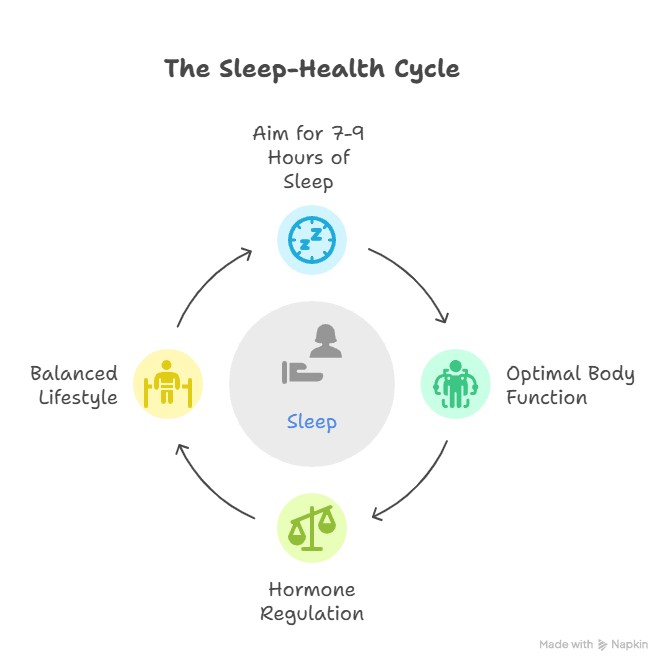
Now let's talk about hormones, which are also quite important in this case! Ghrelin is sometimes called the “hunger hormone” since it alerts your brain when it's time to eat. When you don't get enough sleep, your ghrelin levels go up. Want to know what? That implies you'll be hungry than normal! Leptin works hard to tell you when you're full, but not getting enough sleep lowers its levels. In short, one hormone makes you hungry while another one that is supposed to urge you to “stop eating” takes a break. What a way to set someone up for failure!
So I think we can all agree that no one wants to wake up unhappy because they ate pizza last night. Those leftovers don't give us the nutrition we need, and they also make us feel sluggish all day long, which is a vicious cycle. Instead of grabbing that cold slice from the fridge (no judgment here), think about how amazing it would feel to wake up rejuvenated after a good night's sleep and choose something healthy instead.
Better sleep hygiene can have a big impact on our life, not simply making us feel rested. It can also help keep those annoying hormones in check! Setting regular bedtimes, making calming nightly routines, and limiting screen time before bed are all things that can help us sleep better. We are also more likely to stick to healthier eating habits when we wake up feeling good and ready to take on the day without being irritated or hungry.
In the end, making sleep a priority isn't only about not being grumpy; it's also very important for your health and weight management in today's hectic environment. So the next time you reach for a late-night snack after binge-watching another Netflix show (guilty!), think about hitting pause on the TV and going to bed earlier. You might wake up feeling like a superhero ready to take on breakfast with some tasty whole grains instead of old pizza crusts!
Strategies for Managing Stress Without Gaining Weight

When stressed, some people eat like they're preparing for a food apocalypse, while others might take up knitting—because nothing says “calm” like turning yarn into a sweater while contemplating life choices!
“I’m on the patch right now. I can’t have any sugar. But when I get off it, I’m going to eat everything!” — Oprah Winfrey
Now that we've found the connection between stress and weight gain, let's talk about some useful ways to keep both at bay without losing your mind or your favorite munchies! First, let's work out! When you exercise, your body releases endorphins, which help you deal with stress and keep your weight in check.
You can even do something as basic as taking a stroll every day or dancing around your living room. Trust me, no one will judge you for it! Also, adopting mindfulness techniques like meditation or deep breathing will help you eat better and lessen your overall anxiety.
Stress Management: Funny Facts to Keep the Weight Off
– Laugh It Off: Laughter can burn about 10-40 calories per session! So, watch a funny movie and laugh your way to a lighter mood—and maybe even a lighter body!
– Snack Attack: When stressed, you might crave comfort foods, but try swapping chips for air-popped popcorn—it's light, crunchy, and won't weigh down your stress management efforts.
– Breathe Easy: Deep breathing can help reduce stress and curb cravings. Just remember, no one wants to hear you practicing “belly breathing” in public—it’s not quite as soothing for bystanders!
– Move It or Lose It: Exercise releases endorphins that fight stress. Plus, it gives you an excuse to wear those cute workout clothes—even if you're just doing squats while waiting for the microwave.
– Mindful Munching: Eating mindfully can help prevent stress-induced overeating. Focus on each bite—just don’t get too distracted by Netflix or you might end up polishing off the entire bag of snacks!
– Get Your Zzz's: Sleep deprivation increases cortisol levels (the stress hormone), leading to weight gain. So prioritize sleep; after all, who doesn’t love a good nap?
And don't forget to ask for help when you need it, whether it's talking things over with friends or getting professional help if you need it. Sometimes voicing your problems makes them easier to deal with. We all have days when it feels like the weight of the world is on our shoulders. You get what I'm saying? Those times when you want to shout, “Why is everything so hard?” and throw your hands up in the air. During these times, it might make a huge difference to interact with other people.
Think about it: Have you ever had a talk with a friend that began out feeling weighty but ended up having you laugh so hard your sides hurt? That's what makes friendship so special! A lot of the time, when we talk about our problems, whether they have to do with job, stress, or simply life in general, we find out that we're not the only ones. Our buddies may have gone through similar things or have ideas that we haven't thought of previously. Also, saying our problems out loud instead of having them bounce around in our thoughts like a never-ending loop of horrible music is really freeing.
But sometimes our problems seem too huge for friends and family to deal with. And let's be honest: sometimes they might not know how to respond in the right way (we've all had that one friend who meant well but only wanted to give us advice when we really needed a shoulder to cry on). In these situations, getting professional aid can make a big difference. Therapists and counselors know how to listen without judging and provide us advice that is right for us. They can help us deal with our feelings and learn better ways to deal with them. Think of them as your own cheerleaders, but without the pom-poms!
It's interesting that a lot of people still think that therapy is exclusively for people who are “really struggling.” But to be honest? Talking things over every once in a while can help everyone! No matter what you're going through, asking for help is a sign of strength, not weakness. Which situation looks easier: trying to lift a large box by yourself or asking a buddy for help? Yes!
Also, doing things with other people, like going to support groups or community classes, can help you connect with people who are going through the same things as you. It makes it easier for people to get along because they've been through similar things, like finding other passengers on this crazy voyage we call life! Telling stories over coffee or during yoga classes might help us remember that we're all part of something bigger than ourselves.
So the next time you feel anxious or overwhelmed (which we all do), think about making that first move toward connecting. Get in touch! You may call your best friend for a quick chat or look into local groups where you might meet new people who are going through their own ups and downs. Don't forget that sharing not only makes things easier, but it also lets you laugh and understand others. Isn't that what life is all about?
Finding Balance: A Holistic Approach
Eating a balanced diet is like trying to juggle; if you drop one food group, you might just end up with a pizza in your hand and a side of regret!
“Every time I go on a diet, I have to ask myself, ‘What would I rather be? Hungry or unhappy?’” — Ellen DeGeneres
In the end, the best way to deal with both stress and weight is to take a holistic approach instead of just focusing on diet or exercise. It means being aware of things that make you more anxious and making healthy food choices.
Consider adding activities that help you relax, like yoga or journaling, to your daily routine. These activities can help you deal with stress and become more conscious of your emotional eating patterns.
As I finish this look into the realm where stress and weight gain meet (and vice versa), I hope you'll remember that it takes time (and maybe some trial and error) to find the right balance. Be patient with yourself as you work toward getting well!
Suggested Resources
Stress Management Techniques
https://www.apa.org/topics/stress/manage-techniques
The Link Between Stress and Weight Gain
https://www.healthline.com/nutrition/stress-weight-gain
Understanding Cortisol
https://www.ncbi.nlm.nih.gov/pmc/articles/PMC3700764/
Healthy Eating During Stressful Times
https://www.eatright.org/health/wellness/emotional-wellness/eating-for-emotional-health
Yoga Practices for Reducing Stress
https://www.yogajournal.com/practice/yoga-for-stress-relief
Frequently Asked Questions
Can stress really cause weight gain?
Yes, chronic stress increases cortisol, which can boost appetite, promote fat storage, and lead to overeating—especially high-calorie comfort foods.
Why do I crave unhealthy foods when stressed?
Stress triggers hormonal changes that increase cravings for sugary or fatty foods because they temporarily boost mood through dopamine release.
How does cortisol affect my weight?
Elevated cortisol slows metabolism, increases hunger, and encourages fat storage, particularly around the abdomen.
Can lack of sleep make stress-related weight gain worse?
Yes, poor sleep increases cortisol and disrupts hunger hormones, leading to stronger cravings and difficulty regulating appetite.
What are healthier ways to manage stress without overeating?
Exercise, meditation, deep breathing, journaling, and mindful eating can reduce stress and help prevent emotional eating.
How can I avoid emotional eating during stressful moments?
Pausing to assess hunger, drinking water, choosing nutrient-dense snacks, or engaging in calming activities can help break the cycle.
Should I seek support if stress is affecting my weight?
Yes, reaching out to friends, support groups, or professionals can provide guidance and emotional relief, improving stress and eating habits.

Kevin Collier is a dedicated health enthusiast and writer for FatFAQ.com, where he shares his expertise on weight loss and maintaining a healthy lifestyle. With a focus on practical tips and evidence-based strategies, Kevin aims to inspire readers to achieve their health goals through informed choices. His engaging articles cover nutrition, exercise, and holistic wellness, providing valuable resources for anyone looking to improve their well-being. Passionate about helping others transform their lives, Kevin advocates for sustainable habits that promote lasting health and vitality.


